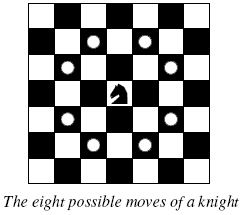A Knight's Journey
| Time Limit: 1000MS | Memory Limit: 65536K | |
| Total Submissions: 31702 | Accepted: 10813 |
Description
 Background
Background The knight is getting bored of seeing the same black and white squares again and again and has decided to make a journey
around the world. Whenever a knight moves, it is two squares in one direction and one square perpendicular to this. The world of a knight is the chessboard he is living on. Our knight lives on a chessboard that has a smaller area than a regular 8 * 8 board, but it is still rectangular. Can you help this adventurous knight to make travel plans?
Problem
Find a path such that the knight visits every square once. The knight can start and end on any square of the board.
Input
The input begins with a positive integer n in the first line. The following lines contain n test cases. Each test case consists of a single line with two positive integers p and q, such that 1 <= p * q <= 26. This represents a p * q chessboard, where p describes
how many different square numbers 1, . . . , p exist, q describes how many different square letters exist. These are the first q letters of the Latin alphabet: A, . . .
Output
The output for every scenario begins with a line containing "Scenario #i:", where i is the number of the scenario starting at 1. Then print a single line containing the lexicographically first path that visits all squares
of the chessboard with knight moves followed by an empty line. The path should be given on a single line by concatenating the names of the visited squares. Each square name consists of a capital letter followed by a number.
If no such path exist, you should output impossible on a single line.
If no such path exist, you should output impossible on a single line.
Sample Input
3 1 1 2 3 4 3
Sample Output
Scenario #1: A1 Scenario #2: impossible Scenario #3: A1B3C1A2B4C2A3B1C3A4B2C4
题意:国际象棋。然后给一个马(马走日) ,能够从随意点出发,找一条能够訪问全部格子(p*q的棋盘)的路径,注意路径假设有多条要求输出字典序最小的那条。。
然后这个能够搜索的时候按字典序搜。
。
就是搜索方向要固定。。不能随意写了
然后其它的没什么了 直接深搜。搜到答案之后直接return ;
#include <algorithm>
#include <iostream>
#include <cstring>
#include <cstdlib>
#include <string>
#include <cctype>
#include <vector>
#include <cstdio>
#include <cmath>
#include <deque>
#include <stack>
#include <map>
#include <set>
#define ll long long
#define maxn 116
#define pp pair<int,int>
#define INF 0x3f3f3f3f
#define max(x,y) ( ((x) > (y)) ? (x) : (y) )
#define min(x,y) ( ((x) > (y)) ? (y) : (x) )
using namespace std;
int n,m,k,ans,dir[8][2]={{-1,-2},{1,-2},{-2,-1},{2,-1},{-2,1},{2,1},{-1,2},{1,2}};
bool vis[27][27];
int sx[30],sy[30],top,ok;
void dfs(int x,int y)
{
if(ok) return ;
if(top==n*m)
{
ok=1;
for(int i=0;i<top;i++)
printf("%c%d",'A'+sy[i]-1,sx[i]);
return ;
}
for(int i=0;i<8;i++)
{
int tx=x+dir[i][0];
int ty=y+dir[i][1];
if(tx>=1&&tx<=n&&ty>=1&&ty<=m&&!vis[tx][ty])
{
vis[tx][ty]=1;sx[top]=tx;sy[top++]=ty;
dfs(tx,ty);
vis[tx][ty]=0;top--;
}
}
}
int main()
{
int T,cas=1;
scanf("%d",&T);
while(T--)
{
scanf("%d%d",&n,&m);ok=0;
printf("Scenario #%d:
",cas++);
memset(vis,0,sizeof(vis));top=0;
vis[1][1]=1;sx[top]=1;sy[top++]=1;
dfs(1,1);
if(!ok)
printf("impossible");
puts("");if(T)puts("");
}
return 0;
}